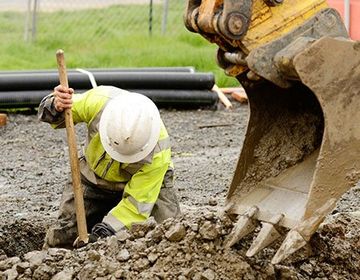Dump Truck Companies in Ohio - Reliable Dump Truck Services Across Ohio
Dump Truck Companies in Ohio - Reliable Dump Truck Services Across Ohio
Blog Article
Comprehensive Excavation Approaches: Grasping the Fundamentals for Success
In the world of construction and civil engineering, the relevance of efficient excavation methods can not be overstated. The mindful preparation, precise implementation, and precise attention to information called for in excavation projects demand a thorough strategy that includes numerous basic aspects. From preliminary dirt analysis to the execution of precaution and normal progress surveillance, mastering these core elements is essential for achieving success in any kind of excavation endeavor. Nonetheless, real mastery lies not merely in recognizing these fundamentals but in effortlessly incorporating them to navigate the complexities of excavation projects with finesse.
Understanding Excavation Job Planning

Effective excavation projects are improved the foundation of comprehensive and precise preparation. The initial phase of any type of excavation task is the preparation stage, where vital choices are made that can dramatically impact the result of the project. Throughout this stage, it is vital to gather all relevant details about the website, consisting of topographical studies, soil composition, and any potential risks that might exist. Comprehending the job spending plan, range, and timeline constraints is essential for producing a comprehensive excavation plan that guarantees the job's success.
One trick facet of excavation task preparation is the development of a detailed timeline that describes the sequence of activities, turning points, and due dates. This timeline serves as a roadmap for the task team, permitting them to track progression and make needed adjustments to make sure the task remains on schedule. Furthermore, a distinct budget that represents all expenditures, including devices leasing, labor expenses, and materials, is crucial for staying clear of expense overruns and delays. By meticulously considering all these factors during the drawing board, excavation projects can be carried out effectively and effectively, causing successful end results.
Dirt Analysis and Website Evaluation
Conducting comprehensive soil evaluation and site examination is a vital step in the preparation phase of any type of excavation task. Soil evaluation entails establishing the structure, structure, and residential or commercial properties of the dirt at the excavation site. This info is vital for recognizing the dirt's bearing ability, moisture material, and capacity for disintegration, which are vital factors in identifying the excavation techniques and devices needed for the task.
Site analysis exceeds soil analysis and incorporates a wider assessment of the overall site conditions. This assessment consists of determining any kind of potential dangers, such as below ground energies, environmental concerns, or unstable terrain, that can influence the excavation process. By completely assessing the website, job managers can develop efficient excavation methods that prioritize safety, efficiency, and environmental security.
Using advanced innovations like ground-penetrating radar, dirt sampling, and drone surveys can improve the accuracy and effectiveness of soil analysis and site assessment. Investing time and sources in these initial steps can eventually save time and stop costly hold-ups or difficulties throughout the excavation process.
Devices Selection and Use
Reliable excavation jobs rely greatly on calculated tools selection and utilization to ensure optimal performance and efficiency. Selecting the ideal tools for the task is essential in making best use of effectiveness and decreasing downtime. Aspects such as the type of soil, depth of excavation, and task extent play a considerable role in establishing the most ideal tools for the task handy.

Along with selecting the proper devices, appropriate use is vital to job success. Operators needs to be educated to handle the equipment securely and successfully - septic ohio. Normal maintenance checks and timely fixings aid protect against breakdowns and make certain regular performance throughout the project
Safety Measures and Regulations Conformity
In the realm of excavation tasks, focusing on precaution and conformity with laws is vital to making certain a legally sound and protected functional setting. Precaution incorporate a variety of practices, read this post here including conducting thorough website assessments, implementing proper signage and barriers, and offering ample security training for all employees associated with the excavation process. Adherence to laws, such as OSHA requirements in the USA, makes certain that the excavation job satisfies the needed requirements to secure employees, bystanders, and the surrounding environment.

Surveillance Progression and Adjusting Methods
How can forecast managers effectively track the advancement of excavation projects and adapt their methods as necessary to enhance results? Tracking progression is essential for guaranteeing that excavation tasks remain on track and meet deadlines.

Conclusion
To conclude, understanding the fundamentals of detailed excavation methods is important for the success of any kind of task. By understanding job planning, assessing dirt and website problems, selecting ideal equipment, abiding by security guidelines, and monitoring development, task supervisors can guarantee web link a smooth and efficient excavation process. Carrying out these strategies will certainly bring about effective end results and decrease potential threats or problems during the excavation job.
The first stage of any excavation project is the planning stage, where critical decisions are made that can dramatically affect the outcome of the task. Recognizing the task spending plan, range, web and timeline restraints is critical for developing a comprehensive excavation plan that makes sure the job's success.
Exactly how can forecast managers efficiently track the advancement of excavation projects and adjust their approaches appropriately to optimize outcomes? By very closely keeping track of progression and being willing to adapt methods, job managers can improve the overall success of excavation projects.
By understanding project preparation, examining soil and website conditions, selecting appropriate tools, conforming with safety guidelines, and checking progress, job supervisors can make certain a reliable and smooth excavation process.
Report this page